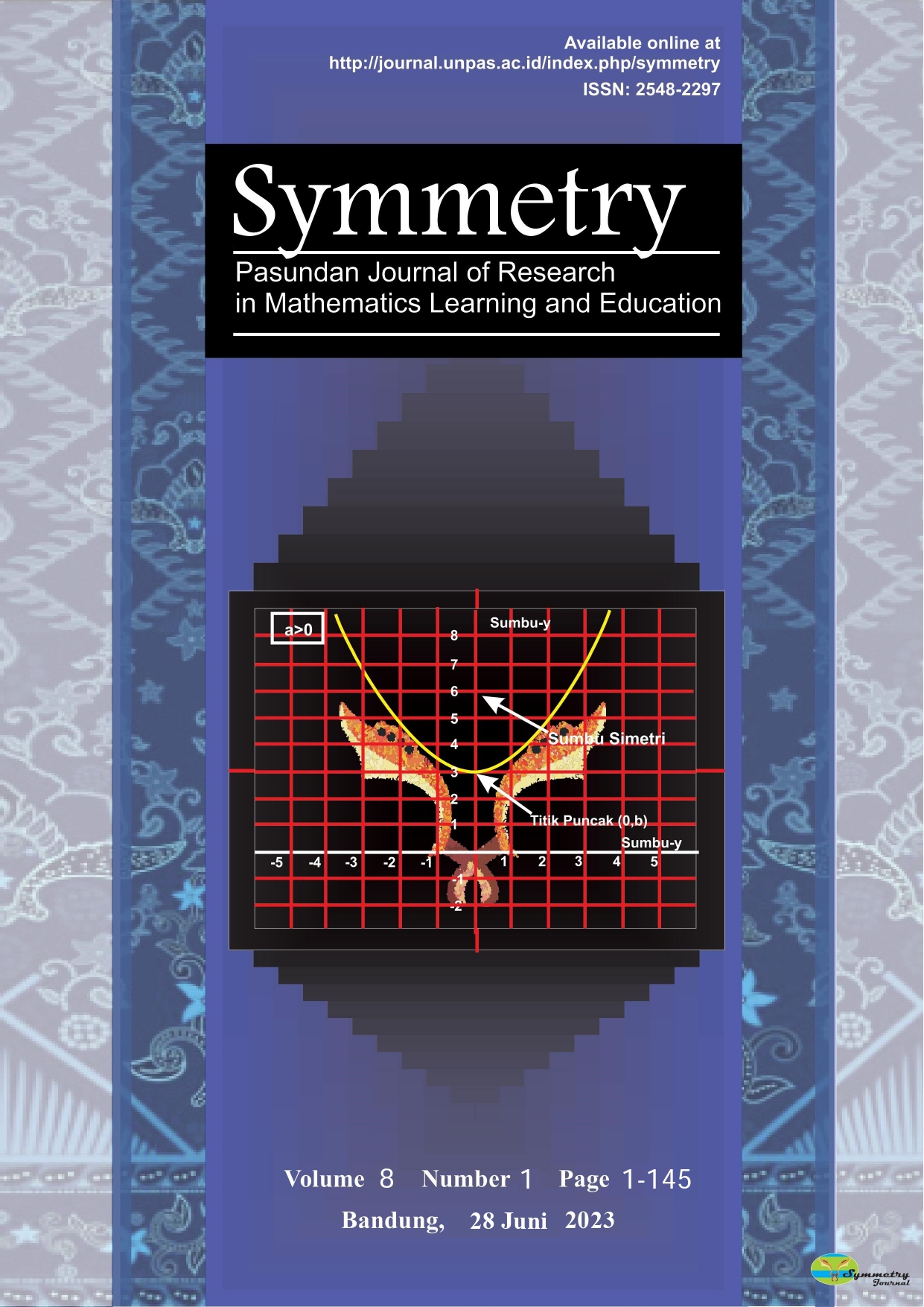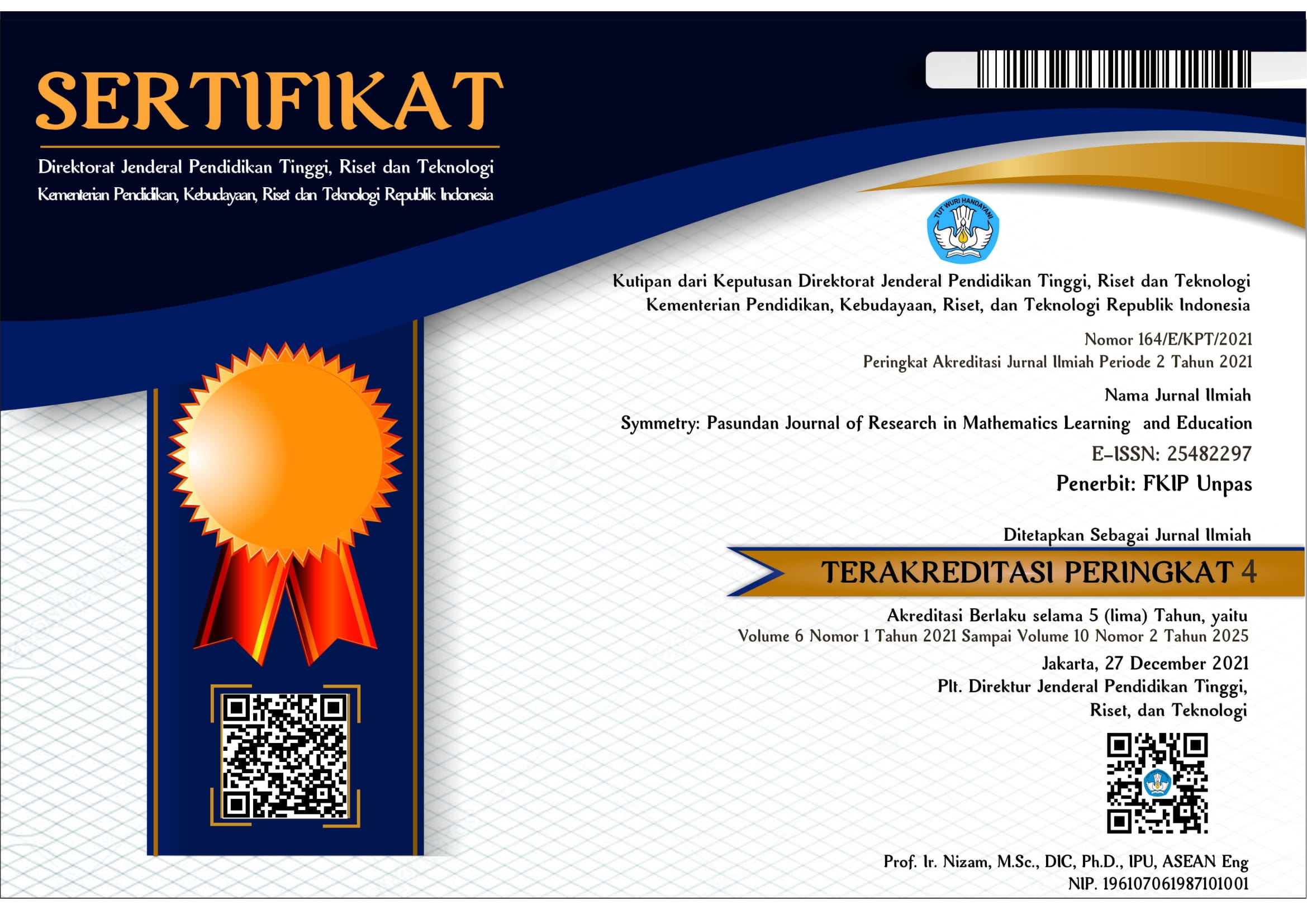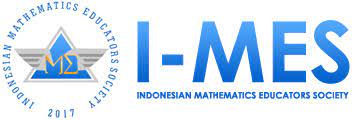SYSTEMATIC LITERATURE REVIEW : ANALISIS PENERAPAN MODEL PROJECT-BASED LEARNING TERHADAP KEMAMPUAN KOMUNIKASI MATEMATIS DAN SELF-CONFIDENCE SISWA
DOI:
https://doi.org/10.23969/symmetry.v8i2.11884Keywords:
Systematic Literature Review (SLR), Kemampuan Komunikasi Matematis, Self- Confidence, Project-Based Learning (PjBL)Abstract
The purpose of this study was to analyze the application of the project-based learning (PjBL) model to students' mathematical communication skills and self-confidence. The research method used is a systematic literature review (SLR), meaning that this research is the result of a systematic review of literature on related topics. A search for relevant articles was carried out in article published from 2016 to 2022 which examine project-based learning, mathematical communication and self-confidence. The literature review comes from online articles from Google Scholar and Mendeley. Based on the research results, there is a positive impact on the application of the project- based learning (PjBL) model on students' mathematical communication abilities and self- confidence. Among them are student-centered learning, learning becomes more meaningful, students can explore knowledge, relate to contextual problems, are active and enthusiastic in discussing
Downloads
References
Alacapinar, F. (2008). Effectiveness of Project-Based Learning. Eurasian Journal of Educational Research. 33. 17-33.
Ambarwati, R. D., & Hendikawati, P. (2015). Keefektivan Model Project-Based Learning Berbasis GQM terhadap Kemampuan Komunikasi Matematis dan Percaya Diri Siswa Kelas VII. Unnes Journal of Mathematics Education. 4(2): 180-186.
Azizah, I. N., & Widjajanti, D. B. (2019). Keefektifan pembelajaran berbasis proyek ditinjau dari prestasi belajar,. Jurnal Riset Pendidikan Matematika. 6(2). 233-243.
Chalim, M. N., Mariani, S., & Wijayanti, K. (2019). Kemampuan Komunikasi Matematis Siswa SMK Ditinjau dari Self-Efficacy pada Setting Pembelajaran Project-Based Learning Terintegrasi STEM. PRISMA, Prosiding Seminar Nasional Matematika. 2. 540-550.
Depdiknas. (2003). Undang-undang RI No. 20 tahun 2003 tentang Sistem Pendidikan Nasional.
Depdiknas. (2006). Permen Nomor 22 Tahun 2006. Jakarta: Depdiknas.
Eka, at al. (2020). Kemampuan Komunikasi Matematis Siswa Dikaji Dari Self Confidence. Jurnal AlphaEuclidEdu. 1(2): 84-93
Elliot, P. C., & Kenny, M. J. 1996. Communication in Mathematics, K-12 and Beyond. USA: NCTM.
Firdaus, A. (2019). Application of Cooperative Learning Model Type Think Pair Share (TPS) on Mathematical Communication Ability. DAYA MATEMATIS : Jurnal Inovasi Pendidikan Matematika. 7(1): 59-68.
Hariyati, R. (2010). Mengenal Systematic Review Theory dan Studi Kasus. Jurnal Keperawatan Indonesia. 13(2): 124-132.
Hendriana, Heris (2014). Penilaian Pembelajaran Matematika. Bandung: PT Refika Aditama Ismayani, A., & Nuryanti. (2016). PENERAPAN PROJECT-BASED LEARNING DALAM PEMBELAJARAN MATEMATIKA UNTUK MENINGKATKAN KEMAMPUAN KOMUNIKASI MATEMATIS DAN AKTIVITAS BELAJAR SISWA. Konferensi Nasional Penelitian Matematika dan Pembelajarannya (KNPMP I). 713-721.
Ismayani, Ani dan Nuryanti. 2016. Penerapan Project Based Learning dalam Pembelajaran Matematika untuk Meningkatkan Kemampuan Komunikasi Matematis dan Aktivitas Belajar Siswa. KNPMP I, Universitas Muhammadiyah Surakarta.
Izzati, N & Suryadi, D. (2008). Komunikasi Matematik dan Pendidikan Matematika Realistik. Prosiding Seminar Nasional Matematika dan Pendidikan Matematika, Yogyakarta, UNY, 27 Nov 2010, ISBN : 978-979- 16353-5-6.
Lestari, K. E., & Yudhanegara, M. R. (2015). Penelitian Pendidikan Matematika. Bandung: PT Refika Aditama.
Lusiana, R., Susanti, V. D., & Andari, T. (2019). PENGARUH PROJECT BASED LEARNING BERBASIS MEDIA INTERAKTIF TERHADAP KEMAMPUAN KOMUNIKASI MATEMATIS. AKSIOMA: Jurnal Program Studi Pendidikan Matematika. 8(3): 354-361.
Maudi, N. (2016). Implementasi Model Project Based Learning Untuk Meningkatkan Kemampuan Komunikasi Matematis Siswa. Jurnal Pendidikan Matematika Indonesia. 1(1): 39-43.
Mawaddah, S., & Mahmudi, A. (2021). ANALISIS KEMAMPUAN KOMUNIKASI MATEMATIKA SISWA MELALUI PENGGUNAAN PROJECT-BASED LEARNING TERINTEGRASI STEM. AKSIOMA: Jurnal Program Studi Pendidikan Matematika. 10(1): 167-182.
NCTM, N. C. (2000). Princeples and Standards for School Mathematics. United States: NCTM.
Nuraeni, K., & Afriansyah, E. (2021). Perbedaan Kemampuan Komunikasi Matematis dan Self Confidence Siswa antara TPS dan STAD. SIGMA: JURNAL PENDIDIKAN MATEMATIKA. 13(1): 33-40.
Purwanti, B. (2015). Pengembangan Media Video Pembelajaran Matematika dengan Model Assure. Jurnal Kebijakan dan Pengembangan Pendidikan. 42-47.
Richter, O. Z., Kerres, M., Bedenlier, S., Bond, M., & Buntins, K. 2019. Systematic Reviews in Education Research: In Contemporary Economic Perspectives in Education.
Schunk, D. H. (2012). Learning theories: An educational perspective. Pearson.
Sembiring, R., & Siregar, R. (2020). Pengaruh Model Pembelajaran Think Pair Share (TPS) terhadap Kemampuan Komunikasi Matematika Siswa Kelas X SMA Melati Binjai Tahun Pelajaran 2019/2020. Jurnal Serunai Matematika. 12(1): 52-59.
Soemarmo, U & Hendriana, H. (2014). Penilaian Pembelajaran Matematika. Bandung: Refika Aditama.
Stivers, J. (2010). Project based learning: A dynamic approach to teaching in which students explore real-world problems and challenges, simultaneously developing 21st century skills while working in small collaborative groups. Educational Psychology.
Tanjung, H. S. (2016) MENINGKATKAN KEMAMPUAN PEMAHAMAN DAN KOMUNIKASI MATEMATIS SISWA SMA NEGERI 6 PADANGSIDIMPUAN MELALUI MODEL PEMBELAJARAN KOOPERATIF TIPE THINK-PAIR-SHARE (TPS) BERBANTUAN AUTOGRAPH. Masters thesis, UNIMED.
UNPAS. (2022). Panduan Penulisan KTI Mahasiswa Universitas Pasundan. FKIP UNPAS. Valle, I., & Barbosa, A. (2017). The Importance of Seing in Mathematics Communication. Journal of The European Teacher Education Network. 12: 49-63
Wijaya, E., Nopriansah, & Susanti, M. (2020). Model Pembelajaran Berbasis Proyek dalam Meningkatkan Kemampuan dan Kepercayaan Siswa. Pedagogia Jurnal Ilmu Pendidikan. 18(02): 136-147.
Zetriuslita & Jarnawi, W. (2018). Mathematical communication ability and curiosity attitude through Problem Based Learning and cognitive conflict strategy based on academic level: A study in number Theory. PEOPLE: International Journal of Social Sciences. 4(2): 726-742
Downloads
Published
Issue
Section
License
Copyright (c) 2023 Symmetry: Pasundan Journal of Research in Mathematics Learning and Education

This work is licensed under a Creative Commons Attribution 4.0 International License.
Hak Cipta sepenuhnya ditangan jurnal.




















